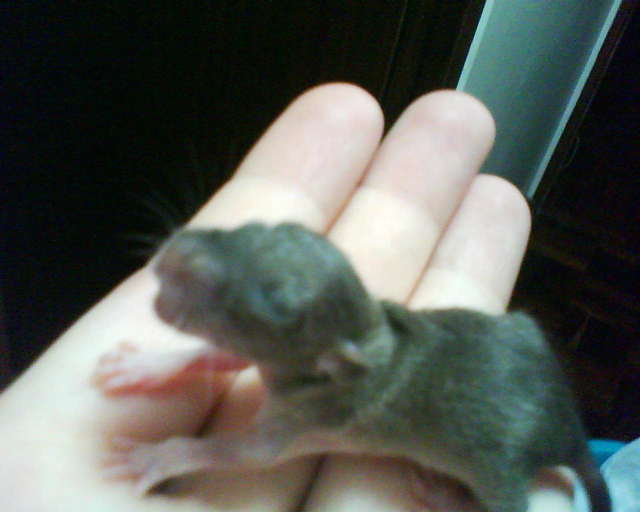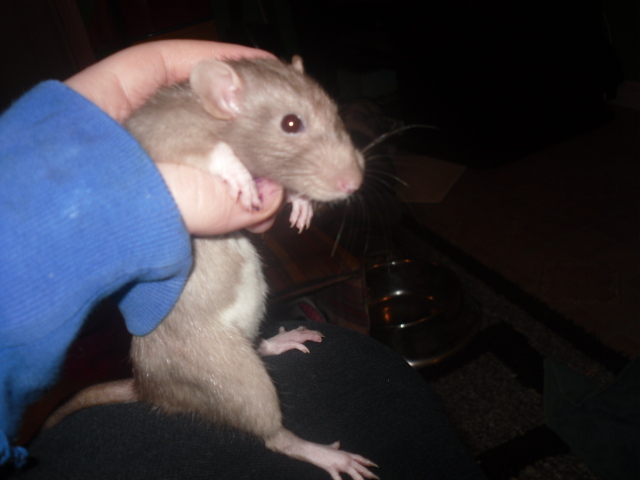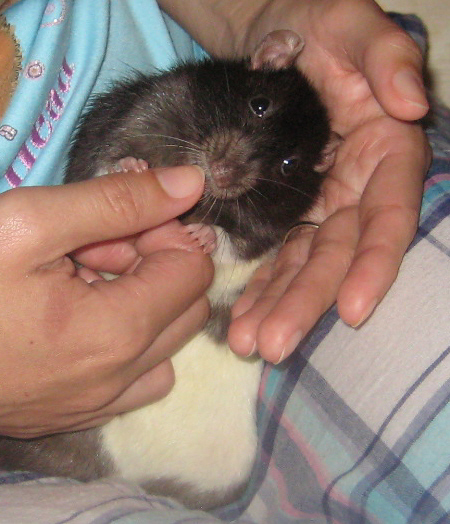QuestionHi,
I have lived with pet rats for over 15 years. Today, I saw my first Patchwork ratties. I brought them home with me. The only information I can find on the internet is just a repetition of the same thing, word for word. It says there are 3 known gene types that cause the hairless and patchwork rats and they all have health problems and shortened life spans...from 9 to 17 months depending on which gene type they carry. Is there anything I can do to prolong these babies, lives? They are so sweet and friendly after just one day with me. It is heartbreaking to think they may not be around even as long as a "normal" rat. Any information, help or advice on the "Patchwork" rat would be appreciated.
Thank you,
Alica Propst
AnswerHi Alica
I had a patchwork hairless rat once, a few years ago. As a matter of fact I dedicated a page to him on my website.
His name was Hairy, AKA Fugs! LOL! He literally "morphed" into a different looking rat every few weeks, losing fur on his face but growing it on his head. It was hilarious! He would look like a raccoon rat and morph into an "Elvis" rat complete with sideburns!
Long story short, he was very high strung and the other male rats did not like him so I didn't want him to live alone so I took him to a vet that claimed she was an exotics specialist. Turns out she was a general vet with an interest in exotics. BIG DIFFERENCE! She killed Hairy during his neuter allowing him to bleed to death despite my begging her over a two day period to open him up again. Well...anyhow, his story and pictures are here:
http://www.freewebs.com/crittercity/whatintheworldisafugs.htm
As for the fact they are less healthy than furred rats? They have a close genetic make up like hairless rats do and a true hairless rat lacks a thymus gland. This, in turn, causes the rat to have a weaker immune system than the furred rats and they have a higher chance of getting sick easier. I am not real into genetics such as a breeder would be since I studied more about rat illnesses, procedures and treatments, rat behavior, etc...so I cant really agree or disagree that the patchwork rat would also lack a thymus gland. Hairless rats also require a bit more protein in their diet, and this is tricky when a hairless shares the cage with furred rats since they should have no more than 15 to 18 percent protein daily.
I have had rats live to be close to 4 years old (my wild hybrid rat, Holly, who I just lost this July) and other rats that lived to be over 3 years old. I lost my only hairless at 18 months from pneumonia but she was a rescue and was not taken care of. I want to believe if I had her from a baby she would have lived longer. I do know people that have had hairless, double rex and patchwork hairless live well past 2 years old so again, not sure how trustworthy it would be to suggest they rarely make it to be 2 years old. As with any rat, if they are well bred for health and temperament, they stand a better chance of living a longer life and how you care for them after you adopt them such as proper diet and husbandry. A healthy happy rat also should be exercised daily and should be allowed to stretch his or her paws out of his cage, climbing all over his owner. This seems to make rats happiest!
Anyhow, I can go through some books at the clinic on genetics and see what I come up with but I wont be back till after the holidays. I may have some info bookmarked on the internet too so I will look here while I am at it. Meantime, do check out Hair, my fugs!! you will fall head over heels in love. Bring kleenex!

 Ratty baba
QuestionPaws yawning.
QUESTION: Hello.
I have a
Ratty baba
QuestionPaws yawning.
QUESTION: Hello.
I have a
 pituitary tumor in male rat?
QuestionQUESTION: Hi, my name is Jennifer and I own a 7
pituitary tumor in male rat?
QuestionQUESTION: Hi, my name is Jennifer and I own a 7
 Do you have any advise for a mouse?
Question
Miss Honey Bun
I know mice and rats are two se
Do you have any advise for a mouse?
Question
Miss Honey Bun
I know mice and rats are two se
 Do you think my rat is pregnant/ When will she have them?
Question
Belly picture.
I bought a rat from a breeder,
Do you think my rat is pregnant/ When will she have them?
Question
Belly picture.
I bought a rat from a breeder,
 Suffering & guilt
QuestionQUESTION: Hi Sandra. This isnt a question, I ju
Suffering & guilt
QuestionQUESTION: Hi Sandra. This isnt a question, I ju